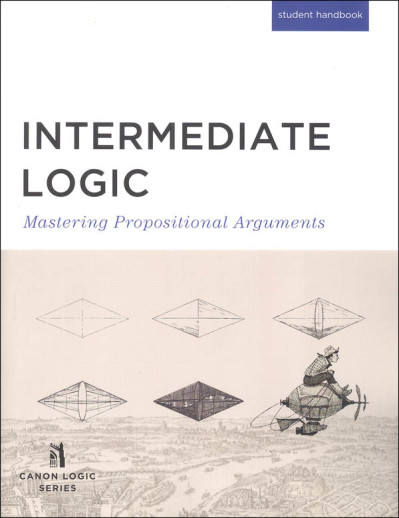We use cookies to make your experience better. To comply with the new e-Privacy directive, we need to ask for your consent to set the cookies. Learn more.
Intermediate Logic: Mastering Propositional Arguments Student Text
SKU
014592
ISBN
9781591281665
Grade 8-12
Christian/Religious
Low Teacher Involvement
Multi-Sensory
Sequential
These icons are designed to help you quickly understand and learn important information about our products.
Teaching Method
Traditional
Teacher-centered curriculum commonly used in classrooms that may include a text, teacher manual, tests, etc.
Charlotte Mason
A methodology based on the work of a 19th century educator who maintained that children learn best from literature (Living Books), not textbooks.
Classical
A methodology based on the Latin Trivium (three stages of learning), including the grammar stage (memorization and facts), logic stage (critical thinking), and rhetoric stage (developing/defending ideas).
Unit Study
A thematic or topical approach centered around one topic that integrates multiple subject areas.
Montessori (Discovery)
A methodology based on the work of a 20th century educator that emphasizes student and sensory-driven discovery learning and real-life applications.
Other
Other methodologies
Religious Content
Secular
Contains content contrary to common Christian beliefs (i.e. evolution).
Neutral
Avoids religious or theoretical topics or presents multiple viewpoints without preference.
Christian/Religious
Faith-based or including instructional religious content.
Learning Modality
Auditory
Learns through listening, talking out loud or reading out loud.
Visual
Learns through seeing, prefers written instructions and visual materials.
Kinesthetic/Tactile (Hands-On)
Learns through moving, doing and touching.
Multi-Sensory
Curriculum that employ a variety of activities/components.
Presentation
Sequential
Curriculum progresses through well-defined learning objectives. Emphasizes mastery before moving to the next topic.
Spiral
Topics and concepts are repeated from level to level, adding more depth at each pass and connecting with review.
Conceptual/Topical
Focus is on the “why,” often with a unifying concept as well as specific skills; coverage may be broader.
Teacher Involvement
Low Teacher Involvement
Student-led materials; parent acts as a facilitator.
Medium Teacher Involvement
A mix of teacher-led time and independent student work.
High Teacher Involvement
Teacher-led lessons; may utilize discussions, hands-on activities and working together.
Additional Materials Required
No other materials needed
Everything you need is included.
Other Materials Required
There are additional required resources that are a separate purchase.
Other Materials Optional
There are additional resources mentioned or recommended but are not absolutely necessary.
Consumable
Consumable
Designed to be written in; not reusable.
Non-Consumable
Not designed to be written in; reusable.
Our Price
$31.99 $31.99 $22.35
Rainbow Savings: $9.64
Description
Refined in the classroom, this text covers propositional logic, proofs, truth tables, truth trees, digital logic, and so much more. Like the first book, this one has been expanded, corrected, and redesigned (it now has 40 consumable lessons).
Publisher's Description of Intermediate Logic: Mastering Propositional Arguments Student Text
Studying formal logic can be intimidating without the right help, but knowing how to think logically isn't just for "experts." Logic should be your secret weapon. It's the tool for learning how to use other tools. It's the bones that give a clenched fist its structure (and knuckles). With that in mind, we have painstakingly designed Intermediate Logic for everyday students, teachers, and parents who've never used truth tables or formal proofs of validity to work with syllogisms, but who know just how important and applicable learning logic is. In Intermediate Logic, you'll get the benefit of our years of teaching experience to help you master propositional arguments:
- How to interpret and analyze logical operators and truth tables by reviewing and applying the concepts of validity, contradiction, consistency, and equivalence,
- How to internalize the nine basic rules of inference to derive an argument's conclusions from its premises,
- How to easily determine consistency, self-contradiction, tautology, equivalence, and validity by using truth trees,
- How to apply all these skills to real-life thinkers and writers wherever you encounter them,
- An all-new optional unit on understanding digital logic, the "language" which modern gadgets (from digital alarm clock displays to computer processors) use to function.
Category Description for Intermediate Logic - Mastering Propositional Arguments
This book is a logical progression from Introductory Logic from Canon Press. Refined in the classroom, this text covers propositional logic, proofs, truth tables, truth trees, digital logic, and so much more. Like the first book, this one has been expanded, corrected, and redesigned (it now has 40 consumable lessons). The format is the same as Introductory Logic. The Teacher Edition is recommended. The DVD Set includes lessons from Brian Kohl, who walks you through all 40 lessons. DVD set also includes practice tests. The Homeschool Package contains the Student Text, Teacher Edition, Test & Quiz Packet, and DVD Set.
Details
| Product Format: | Softcover Book |
|---|---|
| Brand: | Canon Press |
| Grades: | 8-12 |
| ISBN: | 9781591281665 |
| Length in Inches: | 11 |
| Width in Inches: | 8.5 |
| Height in Inches: | 1 |
| Weight in Pounds: | 1.85 |
Videos
Reviews

